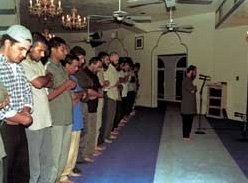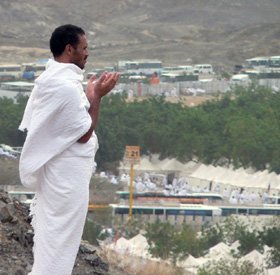The concept of worship in Islam is misunderstood by many people including some Muslims. Worship is commonly taken to mean performing ritualistic acts such as prayers, fasting, charity, etc. This limited understanding of worship is only one part of the meaning of worship in Islam.
The traditional definition of worship in Islam is a comprehensive definition that includes almost everything in any individual’s activities.
The definition goes something like this: “Worship is an all inclusive term for all that God loves of external and internal sayings and actions of a person.” In other words, worship is everything one says or does for the pleasure of Allah. This of course, includes rituals as well as beliefs, social activities, and personal contributions to the welfare of society.
Islam looks at the individual as a whole. One is required to submit oneself completely to Allah, as the Qur’an instructed the Prophet Muhammad (p)1 to do: Say: “Truly, my prayer and my service of sacrifice, my life and my death, are (all) for Allah, the Cherisher of the Worlds. No partner hath He: this am I commanded, and I am the first of those who bow to His will.” [Al-Qur’an 6:162-163]
The natural result of this submission is that all one’s activities should conform to the instructions of the One God to whom the person is submitting. Islam being a complete way of life requires that its followers model every aspect of their life according to its teaching, religious or otherwise. This might sound strange to some people who think of religion as a personal relation between the individual and God, having no impact on one’s daily activities.
As a matter of fact, Islam does not think much of mere rituals when they are performed mechanically and have no influence on one’s inner self.
“It is not righteousness that ye turn your faces towards East or West; but it is righteousness to believe in Allah and the Last Day, and the Angels, and the Book, and the Messengers; to spend of your substance, out of love for Him, for your kin, for orphans, for the needy, for the wayfarer, for those who ask, and for the ransom of slaves; to be steadfast in prayer, and give Zakat, (obligatory annual charity), to fulfill the contracts which ye have made; and to be firm and patient, in pain and adversity, and throughout all periods of panic. Such are the people of truth, the God-fearing.” [Al-Qur’an (2:177]
The deeds in the above verse are the deeds of righteousness and they are only a part of worship. The Prophet told us about faith, which is the basis of worship, that it “is made up of sixty and some branches: the highest of which is the belief in the Oneness of Allah. (i.e., there is no God but Allah) and the lowest in the scale of worship is removing obstacles and dirt from people’s way.”
The Prophet said: “Whoever finds himself at the nightfall tired of his work, God will forgive his sins.” Seeking knowledge is one of the highest forms of worship. The Prophet said, “seeking knowledge is a (religious) duty on every Muslim.” In another saying he said: “Seeking knowledge for one hour is better than praying for seventy years.” Social courtesy and cooperation are a part of worship when done for the sake of Allah as the Prophet told us:
“Receiving your friend with a smile is a type of charity and putting some water in your neighbor’s bucket is a charity.”
It is worth noting that even performing one’s duties is considered an act of worship. The Prophet told us that whatever one spends for his family is a type of charity. Kindness to the members of one’s family is an act of worship as is putting a piece of food lovingly in the mouth of one’s spouse, as the Prophet informed us. Not only this, but even the acts that we enjoy, when performed according to Divine instructions are considered acts of worship.
Thus Islam does not consider the sexual urge as inherently dirty or sinful. It is dirty and sinful only when it is satisfied outside the marital union of man and wife. The Prophet told his companions that they would be rewarded even for having sexual intercourse with their wives. The companions were astonished and asked: “How are we going to be rewarded for doing something we enjoy very much?” The Prophet asked them: “suppose you satisfy your desires illegally, don’t you think that you would be punished for that?” They replied, “Yes.” So, he said: “by satisfying it legally with your wives you are rewarded for it.”
It is clear that the concept of worship in Islam is comprehensive. It includes all positive activities of the individual. This of course is in agreement with the all-inclusive nature of Islam as a way of life. It regulates the human life on all levels: the individual, the social, the economic, the political and the spiritual. All activities are considered by Allah as acts of worship, if done in conformance to His guidance. This should lead us to seek Allah’s pleasure in our actions and always try to do them in the best possible manner, whether we are being watched or we are alone. There is always the permanent supervisor, Who knows, hears and sees everything and that is Allah.
Discussing the non-ritual worship in Islam first does not mean under-evaluating the importance of the ritual ones. Actually ritual worships, if performed in true spirit, elevate the individual morally and spiritually and enable one to perform one’s activities in all walks of life according to the Guidance of God . Among ritual worships, Salah (prayer) occupies the key position for two reasons. Firstly, it is the distinctive mark of a believer. Secondly, it prevents an individual from all sorts of abominations and vices by providing him chances of direct communication with his Creator five times a day, wherein he renews his covenant with God and seeks His guidance again and again.
Salah is the first practical manifestation of Faith and also the foremost of the basic conditions for the success of the believers: “Successful indeed are the Believers, those who humble themselves in their prayers.” [Al-Qur’an 23:1-2] The Prophet (p) further emphasized: “Those who offer their salah with great care and punctuality, will find it a light, a proof of their faith and cause for their salvation on the Day of Judgment.”
After Salah, Zakah (obligatory annual charity) is an important pillar of Islam. In the Qur’an, Salah and Zakah have mostly been mentioned together. Like Salah, Zakah is a manifestation of faith that affirms that God is the sole owner of everything in the universe and what men hold is a trust in their hand that God expects them to discharge.
In this respect Zakah is an act of devotion that, like prayer, brings the believer nearer to his Lord. Apart from this, Zakah is a means of redistribution of wealth in a way that reduces differences between classes and groups. It makes a fair contribution to social stability. By purging the soul of the rich from selfishness, and the soul of the poor from envy and resentment against society. It closes down the channels leading to class hatred and makes it possible for the springs of brotherhood and solidarity to gush forth. Such stability is not merely based on the personal feelings of the rich: it stands on a firmly established right.
Siyam (fasting during the day time of the month of Ramadan) is another pillar of Islam. The main function of fasting is to make a Muslim pure from “within”. By such purity, one promotes what is good, and shuns what is evil. The glorious Qur’an confirms, “O ye who believe! Fasting is prescribed to you as it was prescribed to those before you, that ye may (learn) self-restraint.” [Al-Qur’an 2:183]
In an authentic tradition, the Prophet reported Allah as saying, about the one who fasts: “He suspends eating, drinking, and gratification of his sexual passion for My sake.” Thus his reward is going to be according to God’s great bounty. Fasting awakens one’s conscience, and reminds an individual of the suffering of the less fortunate, and thus promotes a sense of sympathy and kindness to them.
Lastly, we come to Al-Hajj (pilgrimage to the House of God in Makka). This very important pillar of Islam manifests a unique unity, dispelling all kinds of differences. Muslims from all corners of the world, wearing the same dress, respond to the call of Hajj in one voice and language: Labbaik Alla humma Labbaik (Here I am at your service O Lord!). During Hajj there is a strict exercise of self-discipline, where not only sacred things are revered, but even the lives of plants and birds are made inviolable so that everything lives in safety: “Whoever honors the sacred Rites of Allah, for him it is good in the sight of his Lord...” [Al-Qur’an 22:30]
Pilgrimage gives an opportunity to all Muslims from all groups, classes, organizations, and governments from all over the Muslim world to meet annually in a great congress. The time and venue of this congress has been set by their one God. Invitation to attend is open to every Muslim. No one has the power to bar anyone. Every Muslim who attends is guaranteed full safety and freedom as long as he himself does not violate its safety.
Thus the concept of worship in Islam, encompasses every aspect of human life, and is central to the goal of freeing the individual as well as society, from the worship of created things to the worship of the Creator of all things. It is this concept of worship that humanity needs so desperately, and wherein lies the key to our collective salvation.
[Source : WAMY2 Series on Islam]
1 (p) here stands for “peace be upon him”
2 World Assembly of Muslim Youth
http://www.whyislam.org

















 Hide
Hide Looks like you're enjoying the discussion, but you're not signed up for an account.
Looks like you're enjoying the discussion, but you're not signed up for an account.

Bookmarks